School might be out for summer, but we have a multiple choice test for you:
Which school budget category should receive increased funding for the upcoming school year?
Classroom resources, including updated technologyStaff, including increased teachers’ salariesFacilities maintenance, including roof assessments and pavement managementAll of the above
Well...D is the obvious answer. But school budgets are always tight, so deciding where to direct limited funds is a contentious topic. Taxpayers typically like to see their money go to A and B, the tangible benefits that they see directly affecting their kids and their kids’ education. It’s hard for school district officials to make the case for C, unflashy facilities improvements.
However, while we recognize that all aspects of school budgets are important, we’re here to highlight the benefits of C. According to the 2021 State of Our Schools Report, America’s PK-12 public school facilities are underfunded by $85 billion each year, an increase of $25 billion per year from 2016 (adjusted for inflation). Often, deteriorating conditions of facilities are overlooked, or minor problems are shuffled to the back of the funding line until they become impossible to ignore. And at that point, the required fixes come with an enormous price tag. Maintaining facilities is important to the health and safety of the kids who spend so much of their time on school grounds, but also important with regards to keeping small issues from aggressively growing into expensive, disruptive disasters.
Roofs are vital components of the building envelope, keeping students, teachers, and expensive assets dry and protected from the weather. Budgeting for regular roof assessments and repairs can head off a budget-busting emergency roof replacement. In Part I of our series, we’re going to explore three reasons why school districts should be investing in a roof consultant as an integral part of their facilities maintenance programs.
1.A roof consultant can help you understand ALL of your options with objective roof repair and replacement recommendations
You might wonder why your school district needs a roof consultant if they already have a relationship with a good roofing contractor.
Contractors can be super knowledgeable and a great resource to have on speed dial. If a leak pops up, they can quickly run out and make some temporary repairs. Plus, when it comes time for a new roof, they can likely find a deal from their suppliers.
But at the end of the day, roofing contractors make their money by fixing and replacing roofs. That’s not to say they’re going to be dishonest or talk you into making unnecessary repairs or replacements, but there’s a definite conflict of interest. They generally have in-depth knowledge of a few specific systems and products and a good relationship with a few specific manufacturers. They’re going to recommend what they know.
Meanwhile, a roof consultant comes to the table with a wide range of roofing systems knowledge and the best interests of the owner in mind. A roof consultant can objectively assess your roof plus all of the surrounding factors and present a comprehensive set of repair or replacement options. By taking into account current roof type and condition, budget, remaining service life, and building use and age, a roof consultant can take a holistic approach, providing a range of options, as well as the pros and cons of each.
For instance, let’s say you have an older built-up roof that is nearing the end of its service life. Your contractor might recommend a spray-polyurethane foam (SPF) overlay because it’s a relatively cheap option to extend a roof life, plus they’re well trained in the application and know they can get a good deal from their SPF vendor. All valid reasons, but do you know the risks of an SPF overlay? Or how long it will last? Would you actually be better off installing a few patches now and recovering with a single ply or mod-bit overlay next year? Or potentially another option? A roof consultant could tell you.
Once decision-makers understand all of their options and their associated risks and short and long-term budget implications, they can make sure their funds are being used as effectively as possible. Having an objective third party lay out all possibilities – not just ones tied to a certain contractor-manufacturer relationship – can help facilities maintenance officials make informed decisions affecting current and future spending.
2. A roof consultant can help you stay ahead of leaks
We usually take a roof for granted…until it leaks. Then, there’s the mad scramble to set out buckets, find exactly where the water is coming from, make temporary repairs, and clean up the interior. And the next time it rains, the process starts all over.
In addition to creating a frustrating frenzy, leaks have the potential to cause slip-fall hazards, mold, corrosion, and hundreds of thousands of dollars in interior property damage. But what if you had the power to stop some leaks before they even appear?
Having a trusted roof consultant implement regular roof assessments on all of your facilities can help mitigate the flood of headaches, safety concerns, and damages that happen every time it rains. A roof consultant’s trained eye can identify trouble spots that can be addressed before they cause real problems:
Open seams or punctures on single ply or mod-bit roof membranesDeterioration, exposed scrim, and splitting of built-up roofs, single ply, or mod-bit membranesHail damage, including microscopic cracks in single ply membranesFailed fasteners and laps on metal roofsExposed, severe corrosion of metal roof panelsPoorly sealed flashings or counter flashings at penetrations through roofs
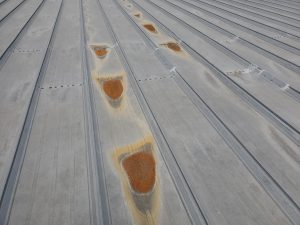
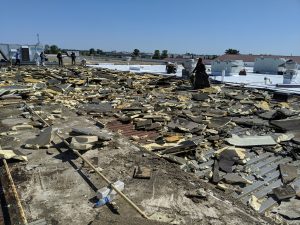
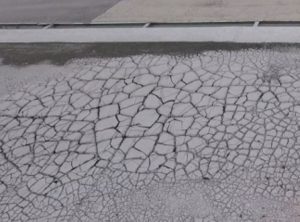
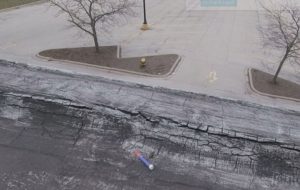
Of course, identifying problem areas is only the first step. You have to be committed to following up on the roof assessment recommendations and keeping some money in the budget for routine repairs. But when it comes to leaks, having the foresight to obtain a roof consultant to conduct routine assessments and then being proactive on maintenance recommendations could help mitigate emergencies down the road.
3. A roof consultant can keep your roof records organized, up to date, and easily accessible
Knowing your roof’s history is important, especially when emergency repairs or building modifications come up. When was the roof installed? By whom? Who’s the manufacturer? What are the warranty terms and conditions? What repairs have been made and when? However, when you’re managing all of the maintenance aspects of multiple buildings on different campuses with what could equate to millions of square feet of facilities, keeping a detailed log of every building’s roof history is a logistical nightmare that is probably the last thing on your mind. So why not hand it off?
A quality roof consultant has the ability to track all of the information about your roofs and get you the data you need when you need it. No more frantically looking through file cabinets for warranty information. Simply call up your roof consultant and they can look it up in their database and send it with a click. With all of the other aspects of facilities maintenance on your plate, delegating roof record keeping to a specialized third party can keep your info organized, up to date, and readily available, while saving your time and effort for the more urgent tasks at hand.
Find out how Wallace Design Collective’s roof consulting services can help you stay on top of your school district’s roof maintenance and give you the information you need to make informed budget decisions. Your best interests are our top priority. We understand school budgets are tight, and we want to help you make the most of your facilities maintenance funding.
Stay tuned for Part II on pavement management!

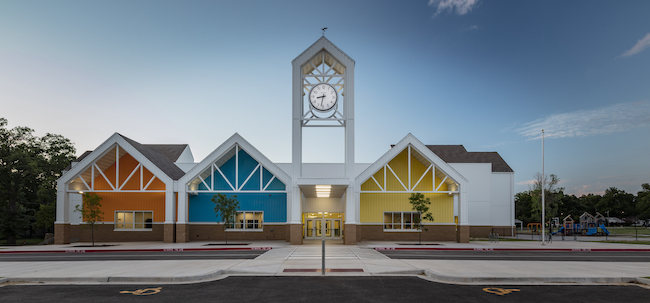





There are no comments.